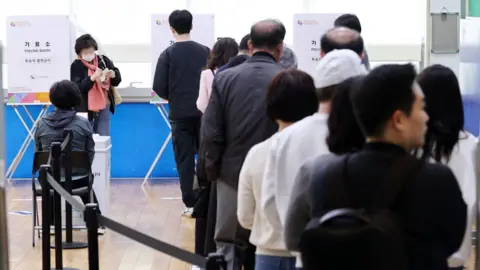Counting under way in South Korea's parliamentary elections
 YONHAP/EPA
YONHAP/EPAVote counting is under way in South Korea as the country awaits the results of its parliamentary elections.
The election is widely seen as a midterm referendum on President Yoon Suk Yeol’s administration, who still has three years left in office.
His People Power Party (PPP) has struggled to achieve its agenda in a legislature dominated by the opposition Democratic Party (DPK).
Mr Yoon is under pressure to address a number of issues including rising food prices, a rapidly aging population and an ongoing doctor’s strike.
Exit polls are projecting that the opposition will secure a majority of the 300-seat parliament, though such polls have proved inaccurate in the past.
In recent weeks, Mr Yoon been criticised for appearing to be out of touch with voters' inflation woes. But the opposition has also faced similar criticism.
If the exit polls prove accurate and the PPP fails to secure a strong representation, Mr Yoon could leave office with little to show for his time, other than his foreign policy achievements.
His major success has been building up relations with Japan and the US to counter China and North Korea.
But that will have little bearing on this election. South Koreans will be voting in line with their wallets more than anything.
The president, whose approval rating has been falling for months, has also battled a series of political scandals since he was elected in March 2022.
A hot mic caught him swearing in September that year after a meeting with US President Joe Biden in New York. His wife Kim Keon Hee has been embroiled in a controversy for allegedly accepting a luxury bag gift, while separate corruption and abuse of power allegations have been levelled at senior members of his party.
Most pressingly for voters however may be cost-of-living concerns.
Just last month, Mr Yoon drew flak for a visit to a Seoul grocery store where he commented that a bundle of green onions priced at 875 won ($0.65) was "reasonable" - when the item had been priced by the store at a discount due to subsidies.
The item would have otherwise been typically priced between 3,000 won and 4,000 won.
Mr Yoon's comments sparked a backlash, with farmers organising sit-in protests with bundles of green onions. The vegetable also started to appear at the DPK's election rallies.
However the main opposition party has also been beleaguered by its own political controversies and internal struggles, and has also faced corruption allegations.
Voter discontent with both major parties could create a window of opportunity for new smaller parties and potentially a more multi-party legislature, analysts say.
"We do have many smaller parties [contesting] this election which is pretty extraordinary. There are 38 smaller parties registered for the proportional seats," said Eunjung Lim, an associate professor at Kongju National University.
But she added that, even with voter disillusionment, the main competition remains between the PPP and the DPK, neither of whom have offered strong policy solutions to the cost-of-living crisis.
"The major concern for Korean voters is inflation... especially groceries. Those prices are deeply related to ordinary people's lives."
At a polling station in Seoul on Wednesday, voters were most concerned about the cost of living.
“I need to buy an apartment, so I need the prices to come down, but I can’t see things improving”, said Kim Hyeon-seo, a recently married finance worker.
An 81-year-old pensioner, Kim Geun-su, said he was struggling with the price of food. “People like me are having a tough time, the prices are too high. I buy a few things with my welfare payments and then there’s nothing left”, he said.
Others voiced frustration about how combative politics in South Korea has become. During the campaign, politicians have focused more on tearing down their opponents than on addressing Korea’s problems.
“I hope the leaders will not fight, and will instead work together to lead this country,” said 85-year-old Hong Ok-sun.
Voters cast one ballot for their representatives in the National Assembly - which makes up 254 seats in the 300-seat parliament. They also vote for a political party, which then allocates the share of the remaining 46 proportional representation seats to party members.
The results, likely to be announced later tonight, will decide the makeup of the country’s parliament for the next four years.
